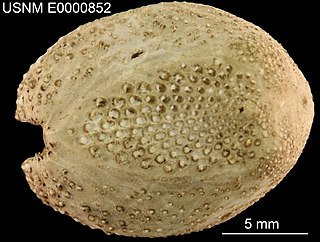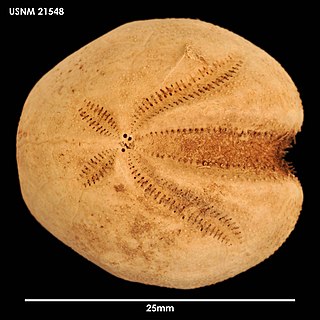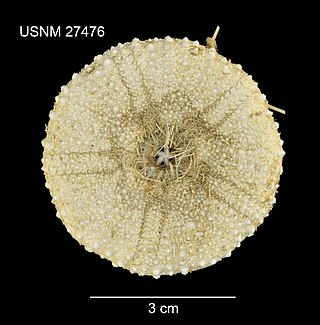
Aceste ovata is a species of sea urchin of the family Schizasteridae. Their armour is covered with spines. It came from the genus Aceste and lives in the sea. Aceste ovata was first scientifically described in 1907 by Alexander Emanuel Agassiz & Hubert Lyman Clark.
Aeropsis fulva is a species of sea urchin of the family Aeropsidae. Their armour is covered with spines. It is placed in the genus Aeropsis and lives in the sea. Aeropsis fulva was first scientifically described in 1898 by Alexander Emanuel Agassiz.
Agassizia excentrica is a species of sea urchin of the family Prenasteridae. The species was first scientifically described in 1869 by Alexander Agassiz.
Aporocidaris fragilis is a species of sea urchin of the family Ctenocidaridae. It is well-armoured with spines. It is placed in the genus Aporocidaris and lives in the sea. Aporocidaris fragilis was first scientifically described in 1907 by Alexander Emanuel Agassiz & Hubert Lyman Clark.

Aporocidaris milleri is a species of sea urchin of the family Ctenocidaridae. Their armour is covered with spines. It is placed in the genus Aporocidaris and lives in the sea. Aporocidaris milleri was first scientifically described in 1898 by Alexander Emanuel Agassiz.

Araeosoma coriacea is a species of sea urchin of the family Echinothuriidae. Its armour is covered with spines. It is placed in the genus Araeosoma and lives in the sea. A. coriacea was first scientifically described in 1879 by Alexander Emanuel Agassiz, an American scientist.

Araeosoma coriaceum is a species of sea urchin of the family Echinothuriidae. Its armour is covered with spines. It is placed in the genus Araeosoma and lives in the sea. A. coriaceum was first scientifically described in 1879 by Alexander Emanuel Agassiz, an American scientist.

Araeosoma leptaleum is a species of sea urchin of the family Echinothuriidae. Its armour is covered with spines. It is placed in the genus Araeosoma and lives in the sea. A. leptaleum was first scientifically described in 1909 by Alexander Emanuel Agassiz & Hubert Lyman Clark.
Araeosoma tessellatum is a species of sea urchin of the family Echinothuriidae. Its armour is covered with spines. It is placed in the genus Araeosoma and lives in the sea. A. tessellatum was first scientifically described in 1879 by Alexander Emanuel Agassiz.
Argopatagus vitreus is a species of sea urchin of the family Macropneustidae. Their armour is covered with spines. It is placed in the genus Argopatagus and lives in the sea. Argopatagus vitreus was first scientifically described in 1879 by Alexander Emanuel Agassiz, an American scientist.
Aspidodiadema tonsum is a species of sea urchin of the family Aspidodiadematidae. Their armour is covered with spines. It is placed in the genus Aspidodiadema and lives in the sea. Aspidodiadema tonsum was first scientifically described in 1879 by Alexander Emanuel Agassiz.
Austrocidaris canaliculata is a species of sea urchins of the family Cidaridae. Their armour is covered with spines. Austrocidaris canaliculata was first scientifically described in 1863 by Alexander Agassiz.

Brisaster latifrons is a species of sea urchins of the family Schizasteridae. Their armour is covered with spines. Brisaster latifrons was first scientifically described in 1898 by Alexander Emanuel Agassiz.

Brisaster moseleyi is a species of sea urchins of the family Schizasteridae. Their armour is covered with spines. Brisaster moseleyi was first scientifically described in 1881 by Alexander Emanuel Agassiz.
Brisaster townsendi is a species of sea urchins of the family Schizasteridae. Their armour is covered with spines. Brisaster townsendi was first scientifically described in 1898 by Alexander Emanuel Agassiz.
Ceratophysa rosea is a species of sea urchins of the family Pourtalesiidae. Their armour is covered with spines. Ceratophysa rosea was first scientifically described in 1879 by Alexander Emanuel Agassiz.

Chaetodiadema pallidum is a species of sea urchins of the Family Diadematidae. Their armour is covered with spines. Chaetodiadema pallidum was first scientifically described in 1907 by Alexander Emanuel Agassiz and Hubert Lyman Clark.
Cidaris abyssicola is a species of sea urchin in the Family Cidaridae. Cidaris abyssicola was first scientifically described in 1869 by Alexander Emanuel Agassiz.
Cionobrissus revinctus is a species of sea urchins of the Family Brissidae. Their armour is covered with spines. Cionobrissus revinctus was first scientifically described in 1879 by Alexander Emanuel Agassiz.

The pourtalesiids (Pourtalesiidae) are a family of irregular sea urchins that live in the deep sea. They are secondarily bilateral-symmetrical and like other representatives of the taxon Holasteroida they lack the lantern of Aristotle, which is typical for many other sea urchins. The genus Pourtalesia was named after Louis-François de Pourtalès who first collected these animals while dredging at a depth of 600 m. The family is known already from the Upper Cretaceous (Maastrichtian) and is distributed worldwide.









